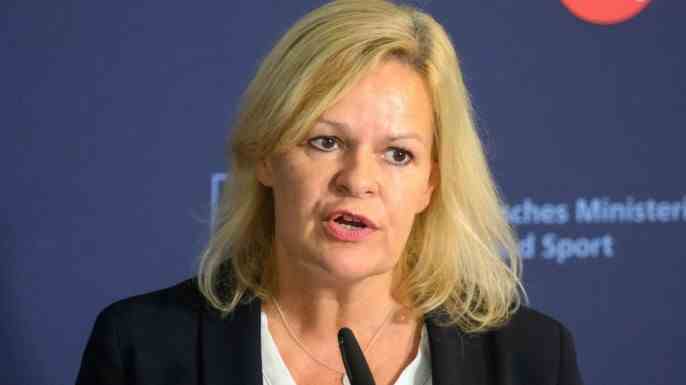Federal Minister of the Interior Nancy Faeser was clear that the topics would be extremely dangerous. With her interior minister colleagues from the SPD, she wanted to discuss better civil protection in the event of large forest fires on Tuesday. There is also growing concern that protests will be appropriated by extremists. When the SPD politician then came to the press conference in Hanover’s Old Town Hall, there was also a question that could become a problem for her: Will Faeser, as a possible top candidate for the SPD for the state elections, move to Hesse?
For months, Faeser has been traded in Wiesbaden as the most promising candidate. In order to have a chance against Prime Minister Boris Rein (CDU) and the equally popular Economics Minister Tarek Al-Wazir from his coalition partner Greens, the SPD would have to send a familiar face into the race – preferably a woman. Many in the Hessian SPD are hoping for Faeser. But the Minister of the Interior has not yet committed herself.
“My heart is in Hesse,” she said at a state party conference in May. That sounded like a promise. On Tuesday, a year before the election, Faeser was asked whether she had already decided to run. Faeser could explain her mood or a schedule. However, the minister says only one word on the subject: “No.”
The tight-lipped reaction makes clear the hardships Faeser is in. Because the pressure is growing from all sides. The election campaign is starting in Hesse – but so far without an SPD face. To elect a top candidate in February, as previously planned, seems too late to some in the SPD. If Faeser throws her hat in the ring, not only the coalition partners in Berlin would be annoyed. You get the feeling that the SPD is using the important post as a springboard for a state election. Faeser could be forced to vacate her post, which the coalition partners don’t really want. The SPD minister enjoys a good reputation, especially among the Greens, but also within the SPD. In view of the mixed situation, confidants now see a greater likelihood that Faeser will stay in Berlin. But nothing has been decided yet.
High energy prices, inflation: Anger in the country could grow
This means that there is still uncertainty about an office that is supposed to create security. The meeting of interior ministers on Tuesday made it clear that the post will require full attention in the coming months. Because the concern in Berlin, but also in the state capitals, is growing that inflation and rising energy prices will increase anger in the country and that extremists could take advantage of this. The federal government is observing “extremist attempts at mobilization,” Faeser warned.
Energy shortages and a significant increase in the cost of living could have an impact on internal security. According to security circles, extremists are trying hard to take hold of the protests. With the AfD, a nationwide party is already trying to “draw fuel from people’s worries,” said Lower Saxony’s Interior Minister Boris Pistorius. The SPD politician described this as “completely wrong.”
In addition, there is a risk of a tangible traffic light coalition conflict in domestic politics. Because Faeser wants to quickly reintroduce data retention. It is about punishing serious cases of abuse or preventing attacks. But the FDP and the Greens have so far rejected this. Data retention is considered an important tool for investigating crimes. However, it is also controversial because it obliges communication providers to store personal data without cause. Next week, the European Court of Justice plans to announce its decision on the controversial German regulation, which has been on hold since 2017. After that, Faeser wants to present a proposal for the new regulation. Knowing the IP addresses is essential for solving crimes, Faeser said on Tuesday.
The interior ministers also want to resolutely combat the increasing risk of forest fires over the next few years. Faeser said that 44 new helicopters are currently being procured for the federal police, which, at 3,000 liters, have a large capacity for extinguishing water. In addition, Germany will join the EU program RescEU and wants to apply for the stationing of EU fire-fighting aircraft in Germany.

